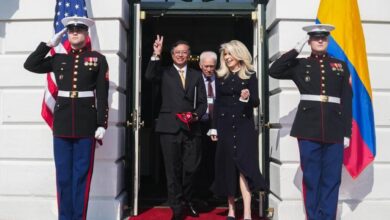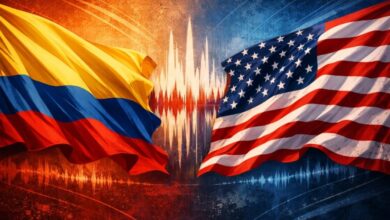Colombia: The Special Powers on Which Gustavo Petro Depends
With the arrival of the first progressive government to the presidency of Colombia, its detractors have serious doubts about the direction that the country will take for four years. One of the facts that increases uncertainty has been the series of “superpowers” that have been given to Gustavo Petro to fulfill what was promised in the campaign.

Photo: Samantha Power – USAID
LatinAmerican Post | David García Pedraza
Escucha este artículo
Leer en español: Colombia: Los poderes especiales de los que depende Gustavo Petro
Gustavo Petro became president of Colombia six months ago, ending the 200-year tradition of right-wing (or traditional party) rulers. With the vote of confidence of more than eleven million people, Petro took over the most important and powerful position in the Andean nation. However, the promises he made in the middle of his political campaign seem to be not so easy to fulfill, for which he has expressed his desire and permission to obtain “superpowers”.
These special powers that Petro is requiring are, to a large extent, to carry out the National Development Plan (PND for its Spanish acronym), which is nothing more than the route that the government, and the country, will take during the three and a half years that remain to comply with the projects with which he promised to carry out. Along with this plan, there is also the discussed health reform, the creation of the Ministry of Equality and the tax reform.
What Are "superpowers" and Why Does Petro's PND Depend on Them?
In Colombia, special powers, or superpowers, are a mechanism protected by the Political Constitution that can be used by the president to create and ratify laws without these being debated in the Legislative branch for their approval. It is used to gain time in moments of political instability or to meet urgent popular needs.
For a president to be worthy of these special powers, he must consult the nation's parliament and obtain the endorsement of the majority of congressmen. It should be noted that this “political freedom” lasts for six months. Arriving at the end of this term, Congress can carefully analyze each law decreed by the president and modify or annul it according to the vote of the state body.
Due to the critical situation in which Colombia lives, with the post-pandemic, the rise of the dollar, the devaluation of the Colombian peso, inflation and the winter wave, the Government of Gustavo Petro considers that it requires the approval of the superpowers to make the PND. The executive requires the reforms proposed by Petro and his government to deal with these situations, or at least, that is what is expected.
What Are the Special Powers that Petro Is Requiring?
Of the more than 20 superpowers that Gustavo Petro has requested, six are in the Health Reform, 14 in the National Development Plan and one has already been approved: the creation of the Ministry of Equality to promote equity in the territory national.
The vast majority of these, 21 special faculties, are of an administrative nature and for the management of public resources to comply with what has been drafted in the reforms that will enter parliamentary debate these days. Some of these are:
- Modification of the national budget in order to finance new expenses that arise at the time of launching the PND.
- Creation of account funds with or without legal status in order for the president to decide how and in what way to dispose of these public resources.
- Acquisition of buildings in order to provide services to citizens, such as the San Juan de Dios Hospital in Bogotá.
- Regulation of alternative uses of coca and cannabis.
- Modification of the government structure without it being discussed in Congress.
- Issuance of judicial decrees to regulate “the special conditions of confinement” of members of indigenous communities.
These special powers enclose the great pillars of Colombian society, embedding in judicial processes, infrastructure awards, movement of public money, change in the government structure, which suggests that this will be the beginning of a profound change that has required the country since its creation as a nation.
What Comes If the Presidential Petition Is Approved or Rejected
In the event that this requirement, which is 20 superpowers, is approved, Petro will finally have the power to use all the permits granted to it by the Legislature, without exceeding its functions, in addition to only having six months to take advantage of this advantage and develop his plan as much as possible. In the event that this request is rejected, the president together with the political coalition of the "Pacto Histórico" must modify the necessary articles so that various political parties join their collective and vote in favor of the laws that the government intends to execute. However, this would require more time to deliberate, with which the country's situation does not count given the need to solve urgent problems for the South American nation.
It may interest you: Marches across Colombia: What Is the Political Landscape in the Country?
Demonstrations for and against the Petro government over the past week in Colombia and some consulates in North America and Europe reflect the political and social division to which this nation has been accustomed since its creation in the 19th century. The superpowers that the president is asking for may become a method for the same society to pressure the Legislature to approve or reject them, and thus develop a new disparity in public opinion.
The political opposition, not having big victories on its desk, has turned to the population to mobilize against the government. For its part, the ruling party has also turned to society to demonstrate its support and faith in the possible change that is promised. This change that, apparently, depends on some superpowers that if approved and not executed in a good way, may become the Achilles heel for Petro and his coalition, and end up giving the reason to a small but powerful opposition.





